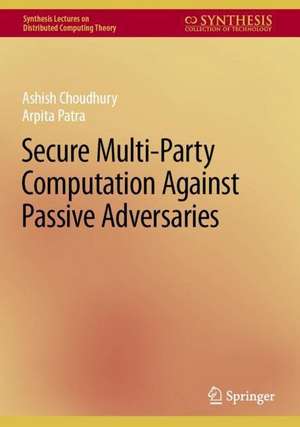Secure Multi-Party Computation Against Passive Adversaries: Synthesis Lectures on Distributed Computing Theory
Autor Ashish Choudhury, Arpita Patraen Limba Engleză Hardback – 8 oct 2022
| Toate formatele și edițiile | Preț | Express |
|---|---|---|
| Paperback (1) | 404.75 lei 6-8 săpt. | |
| Springer International Publishing – 9 oct 2023 | 404.75 lei 6-8 săpt. | |
| Hardback (1) | 400.91 lei 39-44 zile | |
| Springer International Publishing – 8 oct 2022 | 400.91 lei 39-44 zile |
Din seria Synthesis Lectures on Distributed Computing Theory
- 20%
 Preț: 355.13 lei
Preț: 355.13 lei - 20%
 Preț: 219.91 lei
Preț: 219.91 lei - 20%
 Preț: 218.02 lei
Preț: 218.02 lei - 20%
 Preț: 362.65 lei
Preț: 362.65 lei - 20%
 Preț: 367.99 lei
Preț: 367.99 lei - 20%
 Preț: 372.13 lei
Preț: 372.13 lei - 20%
 Preț: 369.58 lei
Preț: 369.58 lei - 20%
 Preț: 214.84 lei
Preț: 214.84 lei - 20%
 Preț: 322.12 lei
Preț: 322.12 lei - 20%
 Preț: 216.91 lei
Preț: 216.91 lei - 20%
 Preț: 288.56 lei
Preț: 288.56 lei - 20%
 Preț: 262.13 lei
Preț: 262.13 lei - 20%
 Preț: 220.09 lei
Preț: 220.09 lei - 20%
 Preț: 217.39 lei
Preț: 217.39 lei - 20%
 Preț: 218.47 lei
Preț: 218.47 lei - 20%
 Preț: 261.81 lei
Preț: 261.81 lei - 20%
 Preț: 261.18 lei
Preț: 261.18 lei - 20%
 Preț: 368.95 lei
Preț: 368.95 lei - 20%
 Preț: 240.22 lei
Preț: 240.22 lei
Preț: 400.91 lei
Nou
Puncte Express: 601
Preț estimativ în valută:
76.73€ • 80.95$ • 63.94£
76.73€ • 80.95$ • 63.94£
Carte tipărită la comandă
Livrare economică 30 decembrie 24 - 04 ianuarie 25
Preluare comenzi: 021 569.72.76
Specificații
ISBN-13: 9783031121630
ISBN-10: 3031121635
Pagini: 231
Ilustrații: XIII, 231 p. 85 illus., 50 illus. in color.
Dimensiuni: 168 x 240 mm
Greutate: 0.52 kg
Ediția:1st ed. 2022
Editura: Springer International Publishing
Colecția Springer
Seria Synthesis Lectures on Distributed Computing Theory
Locul publicării:Cham, Switzerland
ISBN-10: 3031121635
Pagini: 231
Ilustrații: XIII, 231 p. 85 illus., 50 illus. in color.
Dimensiuni: 168 x 240 mm
Greutate: 0.52 kg
Ediția:1st ed. 2022
Editura: Springer International Publishing
Colecția Springer
Seria Synthesis Lectures on Distributed Computing Theory
Locul publicării:Cham, Switzerland
Cuprins
Introduction.- Relevant Topics from Abstract Algebra.- Secret Sharing.- A Toy MPC Protocol.- The BGW Perfectly-Secure MPC Protocol for Linear Functions.- The BGW Perfectly-Secure MPC Protocol for Any Arbitrary Function.- Perfectly-Secure MPC in the Pre-Processing Model.- Perfectly-Secure MPC Tolerating General Adversaries.- Perfectly-Secure MPC for Small Number of parties.- The GMW MPC Protocol.- Oblivious Transfer.
Notă biografică
Ashish Choudhury, Ph.D., is an Associate Professor at the Inter national Institute of Information Technology, Bangalore, India. He received his M.S. and Ph.D. degrees from the Indian Institute of Technology, Madras, India. His research interests include theoretical cryptography, with specialization in cryptographic protocols.
Arpita Patra, Ph.D., is an Associate Professor at the Indian Institute of Science. She received her Ph.D from the Indian Institute of Technology and held post-doctoral positions at the University of Bristol, ETH Zurich, and Aarhus University. Her research interests include cryptography, with a focus on theoretical and practical aspects of secure multiparty computation protocols.
Textul de pe ultima copertă
This book focuses on multi-party computation (MPC) protocols in the passive corruption model (also known as the semi-honest or honest-but-curious model). The authors present seminal possibility and feasibility results in this model and includes formal security proofs. Even though the passive corruption model may seem very weak, achieving security against such a benign form of adversary turns out to be non-trivial and demands sophisticated and highly advanced techniques. MPC is a fundamental concept, both in cryptography as well as distributed computing. On a very high level, an MPC protocol allows a set of mutually-distrusting parties with their private inputs to jointly and securely perform any computation on their inputs. Examples of such computation include, but not limited to, privacy-preserving data mining; secure e-auction; private set-intersection; and privacy-preserving machine learning. MPC protocols emulate the role of an imaginary, centralized trusted third party (TTP) that collects the inputs of the parties, performs the desired computation, and publishes the result. Due to its powerful abstraction, the MPC problem has been widely studied over the last four decades.
In addition, this book:
- Includes detailed security proofs for seminal protocols and state-of-theart efficiency improvement techniques
- Presents protocols against computationally bounded as well as computationally unbounded adversaries
- Focuses on MPC protocols in the passive corruption model, presents seminal possibility and feasibility results, and features companion video lectures
Caracteristici
Includes detailed security proofs for seminal protocols and state-of-theart efficiency improvement techniques Presents protocols against computationally bounded as well as computationally unbounded adversaries Focuses on MPC protocols in the passive corruption model and presents seminal possibility and feasibility results
